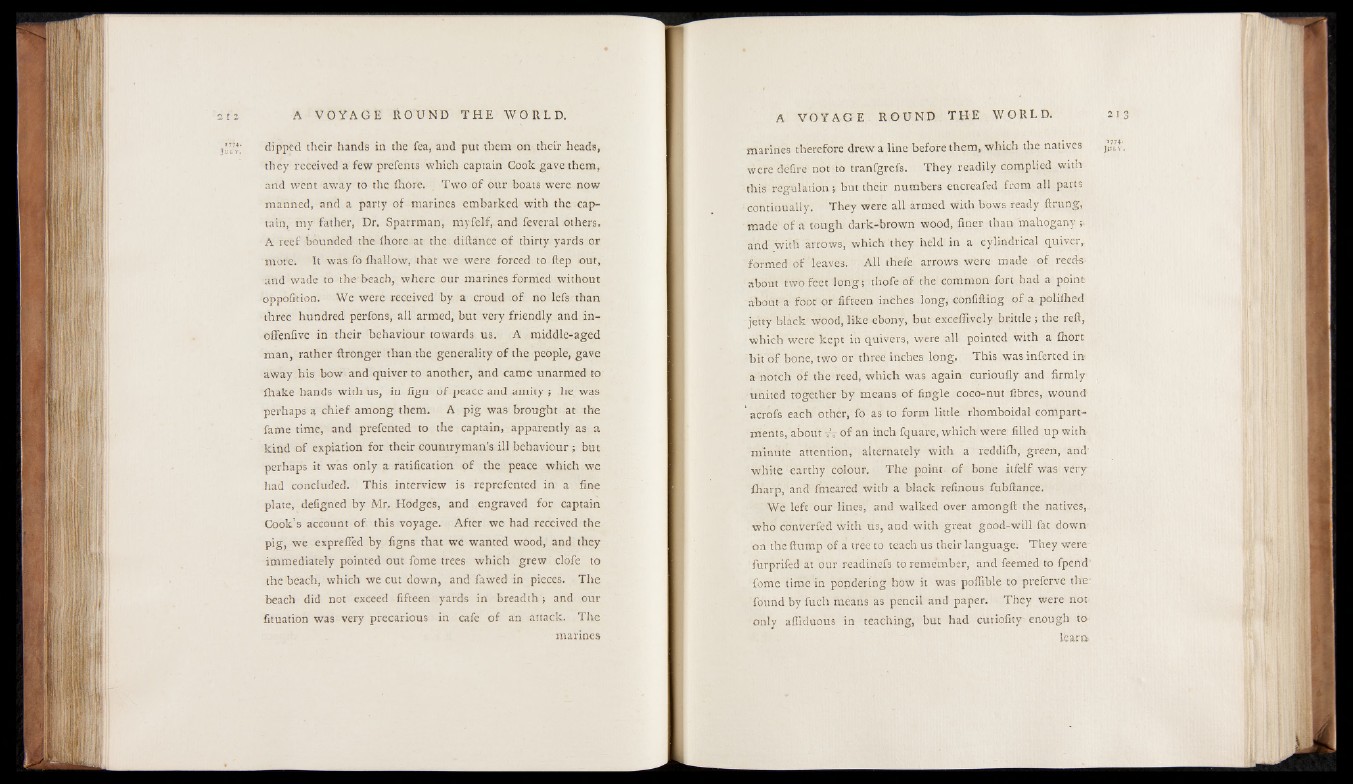
A V O Y A G E ROUND T H E WOULD.
dipped their hands in the fea, and put them on their heads,
they received a few prefents which captain Cook gave them,
and went away to the fhore. Two of our boats were now
manned, and a party of marines embarked with the captain,
my father, Dr. Sparrman, myfelf, and feveral others.
A reef bounded the Ihore at the diftance of thirty yards or
more. It was fo lhallow, that we were forced to ftep out,
and wade to the beach, where our marines formed without
oppofition. We were received by a croud of no lefs than
three hundred perfons, all armed, but very friendly and in-
offenfive in their behaviour towards us. A middle-aged
man, rather ftronger than the generality of the people, gave
away his bow and quiver to another, and came unarmed to
fhake hands with us, in fign of peace and amity ; he was
perhaps a chief among them. A pig was brought at the
fame time, and prefented to the captain, apparently as a
kind of expiation for their countryman’s ill behaviour ; but
perhaps it was only a ratification of the peace which we
had concluded. This interview is reprefented in a fine
plate, defigned by Mr. Hodges, and engraved for captain
Cook’s account of this voyage. After we had received the
pig, we exprefled by figns that we wanted wood, and they
immediately pointed out fome trees which grew clofe to
the beach, which we cut down, and fawed in pieces. The
beach did not exceed fifteen yards in breadth ; and our
fituation was very precarious in cafe of an attack. The
mannes
A V O Y A G E ROUND THE WORLD.
marines therefore drew a line before them, which the natives
were defire not to tranfgrefs. They readily complied with
this regulation ; but their numbers encreafed from all parts
continually. They were all armed with bows ready ftrung,
made of a tough dark-brown wood, finer than'mahogany ;■
and with arrows, which they held in a cylindrical quiver,
formed of leaves. All thefe arrows were made of reeds-
about two feet long; thofe of the common fort had a point
about a foot or fifteen inches long, confifting of a polifhed
jetty black wood, like ebony, but exceffively brittle; the reft,
which were kept in quivers, were all pointed with a fhort
bit of bone, two or three inches long. This was inferted in<
a notch of the reed, which was again curioufly and firmly
united together by means of fingle coco-nut fibres, wound
acrofs each other, fo as to form little rhomboidal compartments,
about -jffiof an inch fquare, which were filled up with
minute attention, alternately with a reddifh, green, and
white earthy colour. The point of bone itfelf was very"
fharp, and fmeared with a black refinous fubftance.
We left our lines, and walked over amongfl: the natives,.
who converfed with us, and with great good-will fat down
on the flump of a tree to teach us their language; They were-
furprifed at our readinefs to remember, and feemed to fpend1
fome time in pondering how it was poflible to preferve the-
found by fuch means as pencil and paper. They were not
only affiduous in teaching, but had curiofity- enough to
learn
2 I
1774' J.P L Y